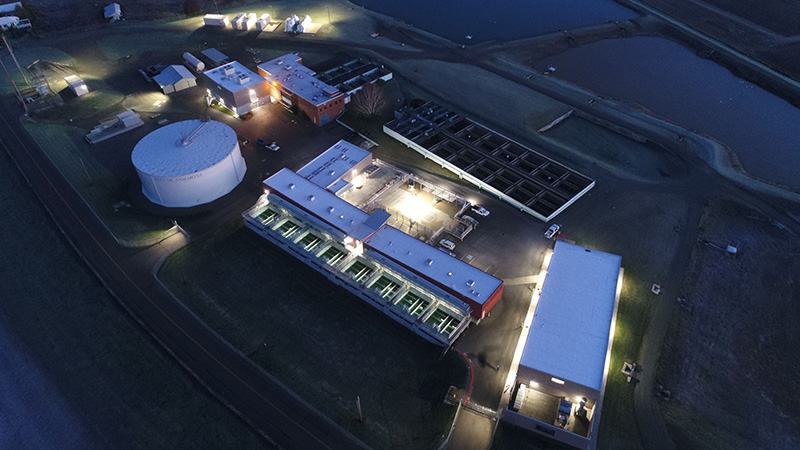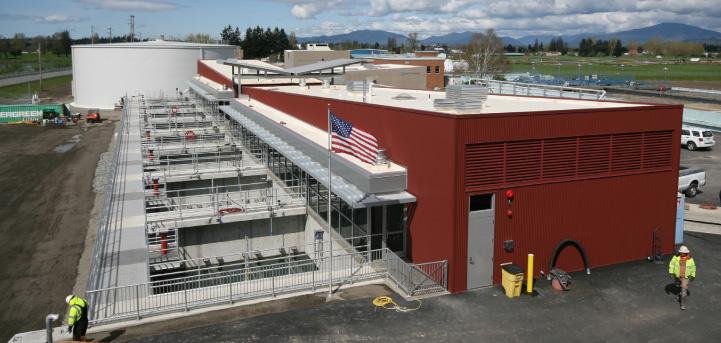Water Treatment Plant General Permit
Water treatment facilities produce water for drinking and for industrial businesses. The Washington State Department of Health makes sure that drinking water is safe and reliable for people. Our role is to ensure any byproducts from water treatment that are released from these facilities do not harm the environment.
Treatment can involve:
- Filtering and settling out sediment and disease-causing organisms.
- Using chemicals to kill organisms or remove excess minerals and other contaminants.
- Adjusting disinfection and chemicals to reduce scaling or corrosion within the delivery system.
We have developed the Water Treatment Plant General Permit to help treatment facilities comply with state laws and the Federal Water Pollution Control Act. This permit contains specific requirements and conditions for permittees to protect rivers and other waterbodies that receive wastewater discharges.
For a short explanation of the permit, please read the Water Treatment Plant General Permit Focus Sheet
The current permit went into effect on Sept. 1, 2024 and expires on Aug. 31, 2029.

Anacortes Water Treatment Plant
Receive email updates
Join our Water Treatment Plant email notification list to receive updates about this permit.
Permit documents
- Current Permit (effective Sept.1, 2024)
Water treatment plant reports
Between 2014 and 2018, we reviewed data concerning water treatment plants in Washington, including:
- Arsenic monitoring data provided by permittees.
- Data about raw water sources, finished water production rates, volumes of wastewater discharged, and populations served for more than 900 water treatment plants statewide.
The two reports identified below summarize that work and our findings and conclusions.

Anacortes Water Treatment Plant
Does my facility need this permit?
You need this general permit if your water treatment plant discharges wastewater to surface waters and:
- Produces 35,000 gallons per day or more (monthly total divided by the number of days in the month) of finished drinking and industrial water.
- The primary function of the facility is treatment and distribution of potable or industrial water.
- Produces wastewater by filtration processes.
- Is not a part of a larger permitted facility.
Operations not covered by this permit include discharge of wastewater that is:
- Produced by one of the following processes:
- Ion exchange
- Reverse osmosis
- Slow sand filtration
- Sent to a publicly-owned treatment works delegated by Ecology.
- Released to land where runoff or overflow is impossible.
If any of these are the case, you may need an individual permit.
For permittees located in the following counties:
Benton, Chelan, Douglas, Kittitas, Klickitat, Okanogan, and Yakima
Marcia Porter
Permit Manager
marcia.porter@ecy.wa.gov
509-454-7864
For permittees located in the following counties:
Adams, Asotin, Columbia, Ferry, Franklin, Garfield, Grant, Lincoln, Pend Oreille, Spokane, Stevens, Walla Walla, and Whitman
David Ennis
Permit Manager
david.ennis@ecy.wa.gov
509-220-9194
For permittees located in the following counties:
Island, King, Kitsap, San Juan, Skagit, Snohomish, and Whatcom
Madison Diaz
Permit Manager
madison.diaz@ecy.wa.gov
425-495-1777
For permittees located in the following counties:
Clallam, Clark, Cowlitz, Grays Harbor, Jefferson, Kitsap, Lewis, Mason, Pacific, Pierce, Skamania, Thurston, and Wahkiakum
Alisha Mckittrick
Permit Administrator and Data Compliance Professional
alisha.mckittrick@ecy.wa.gov
564-999-3587
Contact information
James Hovis
General Permit Writer
james.hovis@ecy.wa.gov
564-999-3244

